Choose Your Sport
Showcase talents. Build skills. Develop character traits. Change stereotypes about people with intellectual abilities. These are just some of the opportunities provided by Special Olympics New York, through training and competition in 22 Olympic-style sports.
Participation is free to registered athletes. We cover the costs of insurance, facilities, equipment, uniforms, awards, housing and meals at events, and more. Special Olympics New York rules support the widest range of abilities possible, giving all athletes a level playing field.
Showcase talents. Build skills. Develop character traits. Change stereotypes about people with intellectual abilities. These are just some of the opportunities provided by Special Olympics New York, through training and competition in 22 Olympic-style sports.
Participation is free to registered athletes. We cover the costs of insurance, facilities, equipment, uniforms, awards, housing and meals at events, and more. Special Olympics New York rules support the widest range of abilities possible, giving all athletes a level playing field.
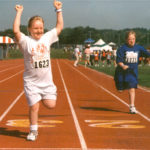 The sport of athletics encourages athletes of all abilities and ages to compete at their optimum level. Through the track-and-field-based athletics training program, participants can develop total fitness to compete in any sport. As with all Special Olympics sports, athletics offers athletes the opportunity to learn through skill development and competitive settings and to be involved in large social settings.
The sport of athletics encourages athletes of all abilities and ages to compete at their optimum level. Through the track-and-field-based athletics training program, participants can develop total fitness to compete in any sport. As with all Special Olympics sports, athletics offers athletes the opportunity to learn through skill development and competitive settings and to be involved in large social settings.
Summer: March through June, with State Summer Games in June
Governing Body: USA Track & Field
Basketball is a one of the top sports at Special Olympics. Players take it up at all ages and at all abilities, from young players learning to 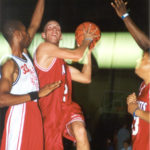 handle the ball and keep it under control while dribbling to older, more experienced players who have the moves and know the strategies to play challenging ball.
handle the ball and keep it under control while dribbling to older, more experienced players who have the moves and know the strategies to play challenging ball.
Summer: March through June, with State Summer Games in June
Governing Body: National Federation of State High School Associations
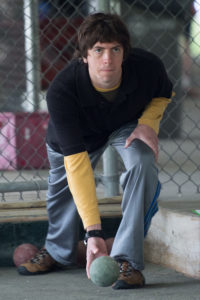 Bocce is an Italian game. The basic principle of the sport is to roll a bocce ball closest to the target ball, which is called a pallina. Bocce as a Special Olympics sport provides people with special needs the opportunity to have social contact, develop physically and to gain self-confidence. Next to Soccer and Golf, Bocce is the third most participated sport in the world.
Bocce is an Italian game. The basic principle of the sport is to roll a bocce ball closest to the target ball, which is called a pallina. Bocce as a Special Olympics sport provides people with special needs the opportunity to have social contact, develop physically and to gain self-confidence. Next to Soccer and Golf, Bocce is the third most participated sport in the world.
Fall: July through September, with State Fall Games in October
Governing Body: World Bocce Association
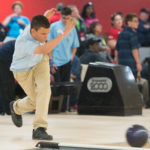 Ten-pin Bowling commonly called "Bowling" in the US, is a competitive sport in which a player (the "bowler") rolls a bowling ball down a wooden or synthetic lane with the objective of scoring points by knocking down as many pins as possible. Bowling is considered to be among the most popular sport in the Special Olympics. It is a particularly beneficial sport to people with intellectual disabilities, irrespective of their age or sports abilities, since it ensures physical exercise and at the same time participation and social integration.
Ten-pin Bowling commonly called "Bowling" in the US, is a competitive sport in which a player (the "bowler") rolls a bowling ball down a wooden or synthetic lane with the objective of scoring points by knocking down as many pins as possible. Bowling is considered to be among the most popular sport in the Special Olympics. It is a particularly beneficial sport to people with intellectual disabilities, irrespective of their age or sports abilities, since it ensures physical exercise and at the same time participation and social integration.
Summer: March through June, with State Summer Games in June
Governing Body: USA Bowling
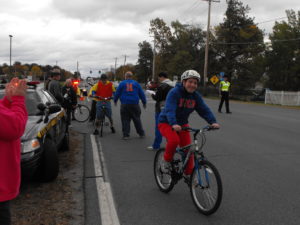 Cycling is a fascinating sport that requires good physical condition, balance, endurance and tactics. Special Olympics include time trial and road race events in different distances. Every athlete riding his/ hers bike aims at traveling at the best possible time and arrive at the finish line first.
Cycling is a fascinating sport that requires good physical condition, balance, endurance and tactics. Special Olympics include time trial and road race events in different distances. Every athlete riding his/ hers bike aims at traveling at the best possible time and arrive at the finish line first.
Fall: July through October, with State Fall Games in October
Governing Body: USA Cycling
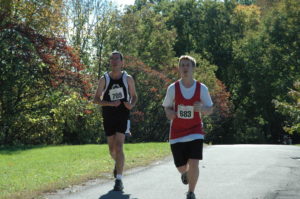 The sport of athletics encourages athletes of all abilities and ages to compete at their optimum level. Through the track-and-field-based athletics training program, participants can develop total fitness to compete in any sport. As with all Special Olympics sports, athletics offers athletes the opportunity to learn through skill development and competitive settings and to be involved in large social settings.
The sport of athletics encourages athletes of all abilities and ages to compete at their optimum level. Through the track-and-field-based athletics training program, participants can develop total fitness to compete in any sport. As with all Special Olympics sports, athletics offers athletes the opportunity to learn through skill development and competitive settings and to be involved in large social settings.
Fall: July through October, with State Fall Games in October
Governing Body: USA Track & Field
 One of the most fascinating sports during the Special Olympics World Games. The balance, the stability and the right communication between the horse and the rider is a key element for success in Equestrian sport.
One of the most fascinating sports during the Special Olympics World Games. The balance, the stability and the right communication between the horse and the rider is a key element for success in Equestrian sport.
Fall: July through October, with State Fall Games in October
Governing Body: United States Equestrian Team
Note: Equestrian coaches have specialized training and extensive experience
Esports are a form of sport competition using video games. Due to their competitive implications, remote accessibility, and opportunities for players to improve, esports are an excellent fit for Special Olympics NY athletes.
Floorball is a versatile indoor team sport developed in the 1970s in Sweden, played in a rink with five field players plus a goalkeeper in each team. Floorball is played with plastic sticks and a light ball and with a goalkeeper without a stick. Floorball has similarities with hockey sports and the main objective is to score more goals than the opposite team. For Special Olympics the game is slightly modified from the "regular" form of Floorball. Matches are played 3 versus 3 with goalkeepers, on a smaller court that measures 20 m long by 12 m wide. This form of Floorball was developed for the intellectually disabled, and will be a demonstration sport at the 2013 Special Olympics World Winter Games in Korea.
 Golf is a precision club and ball sport, in which competing players (or golfers) use many types of clubs to hit balls into a series of holes on a golf course using the fewest number of strokes. The game is played on golf “courses”, each of which features a unique design, although courses typically consist of either nine or 18 holes.
Golf is a precision club and ball sport, in which competing players (or golfers) use many types of clubs to hit balls into a series of holes on a golf course using the fewest number of strokes. The game is played on golf “courses”, each of which features a unique design, although courses typically consist of either nine or 18 holes.
Fall: July through October, with State Fall Games in October
Governing Body: United States Golf Association
Artistic Gymnastics is a discipline of gymnastics where gymnasts perform short routines (ranging from approximately 30 to 90 seconds) on different apparatus, with less time for vaulting.
Winter: November through February, with State Winter Games in February
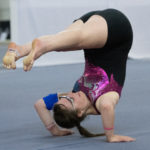
Governing Body: USA Gymnastics
Note: Gymnastics coaches have specialized training and extensive experience
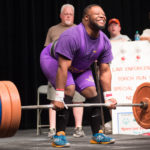 Every athlete aims in lifting more weights than the opponent using specific moves. In Special Olympics Powerlifting is much more than deadlift, squat or bench press. It is effort, persistence and loyalty. Training, determination and attitude, are the key facts that define the balance between a successful or a failed attempt. The barbell, despite testing the physical strength, is also highlighting the athlete’s inner wish to improve, “not to make compromises.”
Every athlete aims in lifting more weights than the opponent using specific moves. In Special Olympics Powerlifting is much more than deadlift, squat or bench press. It is effort, persistence and loyalty. Training, determination and attitude, are the key facts that define the balance between a successful or a failed attempt. The barbell, despite testing the physical strength, is also highlighting the athlete’s inner wish to improve, “not to make compromises.”
Summer: March through June, with State Summer Games in June
Governing Body: USA Powerlifting
Note: Powerlifting coaches have specialized training and extensive experience
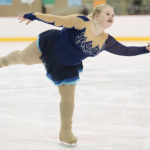 Figure skating is a sport in which individuals, pairs, or groups perform spins, jumps, footwork and other intricate and challenging moves on ice skates. Figure skaters compete at various levels from beginner up to the Olympic level (senior), and at local, national, and international competitions.
Figure skating is a sport in which individuals, pairs, or groups perform spins, jumps, footwork and other intricate and challenging moves on ice skates. Figure skaters compete at various levels from beginner up to the Olympic level (senior), and at local, national, and international competitions.
Winter: November through February, with State Winter Games in February
Governing Body: United States Figure Skating Association
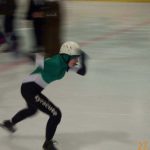 Speed Skating today is a lifetime fitness sport for individuals of all ages. Speed Skating provides both cardiovascular and aerobic benefits as well as improving muscle strength, balance, and coordination. Today, the sport can be enjoyed year round with indoor skating facilities found throughout the world. As a recreational and competition sport, Ice Speed Skating offers the potential for social integration for both training and competition experiences within multi-level Special Olympics competition experiences as well as training and competition experiences through this sport's National Governing Body.
Speed Skating today is a lifetime fitness sport for individuals of all ages. Speed Skating provides both cardiovascular and aerobic benefits as well as improving muscle strength, balance, and coordination. Today, the sport can be enjoyed year round with indoor skating facilities found throughout the world. As a recreational and competition sport, Ice Speed Skating offers the potential for social integration for both training and competition experiences within multi-level Special Olympics competition experiences as well as training and competition experiences through this sport's National Governing Body.
Winter: November through February, with State Winter Games in February
Governing Body: USA Speedskating
Alpine skiing is a demanding sport, and athletes will benefit by being in good physical condition to compete successfully and safely. Alpine skiing requires, in addition to a basic combination of endurance and strength, a high capacity of quickness and action/reaction endurance. Through proper training, the athletes improve their physical, psychological and mental efficiency.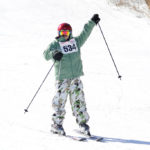
Winter: November through February, with State Winter Games in February
Governing Body: United States Ski Association
Note: Alpine skiing coaches have specialized training and extensive experience
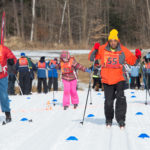 Cross Country Skiing is offered as one of 4 Special Olympics snow sports, along with Alpine Skiing, Snowboarding and Snowshoeing. Cross Country Skiing is a winter sport in which participants propel themselves across snow-covered terrain using skis and poles.
Cross Country Skiing is offered as one of 4 Special Olympics snow sports, along with Alpine Skiing, Snowboarding and Snowshoeing. Cross Country Skiing is a winter sport in which participants propel themselves across snow-covered terrain using skis and poles.
Winter: November through February, with State Winter Games in February
Governing Body: FIS
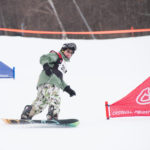 Snowboarding is a sport that involves descending a slope that is covered with snow on a snowboard attached to a rider's feet using a special boot set onto mounted binding.
Snowboarding is a sport that involves descending a slope that is covered with snow on a snowboard attached to a rider's feet using a special boot set onto mounted binding.
Winter: November through February, with State Winter Games in February
Governing Body: FIS
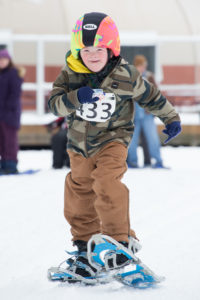 Snowshoeing is quickly becoming a favorite for outdoor winter activity. Combining aerobic activity with ease of walking over snow without sinking in, snowshoeing is an activity for all ages. Snowshoe races are part of the Arctic Winter Games and the winter Special Olympics.
Snowshoeing is quickly becoming a favorite for outdoor winter activity. Combining aerobic activity with ease of walking over snow without sinking in, snowshoeing is an activity for all ages. Snowshoe races are part of the Arctic Winter Games and the winter Special Olympics.
Winter: November through February, with State Winter Games in February
Governing Body: Special Olympics
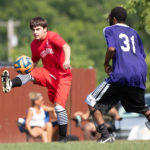 Played in just about every country, the sport’s success is due to the fact that it can be played by boys, girls, men and women of just about any physical build and ability. Football requires little in the way of specialized equipment and is organized using simple, intuitive rules.
Played in just about every country, the sport’s success is due to the fact that it can be played by boys, girls, men and women of just about any physical build and ability. Football requires little in the way of specialized equipment and is organized using simple, intuitive rules.
Fall: July through October, with State Fall Games in October
Governing Body: USA Soccer
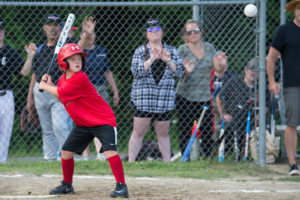 Softball is a bat-and-ball sport played between two teams of 10 to 14 players. Every team aims in scoring as many runs possible, against the opponents by striking the ball with a specific bat. It is a direct descendant of baseball although there are some key differences: softballs are larger than baseballs, and the pitches are thrown underhand rather than overhand. The game is played on a smaller diamond than in baseball and despite the game's name, the standard softball is not soft; in fact, it is harder than a baseball.
Softball is a bat-and-ball sport played between two teams of 10 to 14 players. Every team aims in scoring as many runs possible, against the opponents by striking the ball with a specific bat. It is a direct descendant of baseball although there are some key differences: softballs are larger than baseballs, and the pitches are thrown underhand rather than overhand. The game is played on a smaller diamond than in baseball and despite the game's name, the standard softball is not soft; in fact, it is harder than a baseball.
Number of Athletes Statewide: 3,365
Fall: July through October, with State Fall Games in October
Governing Body: Amateur Softball Association
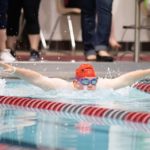 Swimming is one of the most popular sports in world. Unlike other sports, swimming is a life skill that is taught, first, to ensure safety and, secondly, for sports and competition purposes. Aquatics covers a great variety of swimming skills, from short sprints to longer events and relays.
Swimming is one of the most popular sports in world. Unlike other sports, swimming is a life skill that is taught, first, to ensure safety and, secondly, for sports and competition purposes. Aquatics covers a great variety of swimming skills, from short sprints to longer events and relays.
Summer: March through June, with State Summer Games in June
Governing Body: USA Swimming
Note: Aquatics coaches have specialized training and extensive experience
 Tennis is a popular sport played by players of all ages, at all levels of ability. Athletes are trained in all aspects of the game, including stroke production, court craft and the rules of competition.
Tennis is a popular sport played by players of all ages, at all levels of ability. Athletes are trained in all aspects of the game, including stroke production, court craft and the rules of competition.
The sport emphasizes values, such as fair play, sportsmanship and respect for fellow competitors. Tennis is not only fun to play, but it is a lifetime sport activity that is fun to practice and fun to learn.
Summer: March through June, with State Summer Games in June
Governing Body: Tennis Federation (ITF)
Unified Sports joins people with and without intellectual disabilities on the same team. It was inspired by a simple principle: training together and playing together is a quick path to friendship and understanding.
Unified Sports are recognized as an official program of NYSPHSAA.
Special Olympics New York and NYSPHSAA have a shared philosophy that authentic and credible athletics have the greatest impact on the student athlete and serve the greater purpose of destroying stigma and stereotypes of people with Intellectual Disabilities. Similar to the educational concept of Least Restrictive Environment, rule modifications are minimal to ensure integrity and a true interscholastic sports experience.
Offerings
Fall– currently no sport offerings
Winter– Unified Bowling (January-March)
Spring– Unified Basketball Team and Skills*** (April-June)
*All schools must start with Unified Basketball.
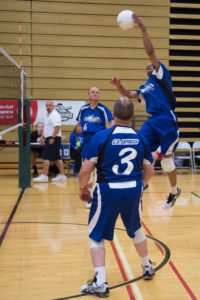 The game of volleyball is attractive to all types of players, from competitive to recreational, young and old. To play volleyball players need to acquire a few basic skills, learn a few rules, require very little equipment, and can play the game almost anywhere – from the beach to the gym. The aim of the sport is to score more points by hitting the ball with the hands and sending it over the net to the opponent's court.
The game of volleyball is attractive to all types of players, from competitive to recreational, young and old. To play volleyball players need to acquire a few basic skills, learn a few rules, require very little equipment, and can play the game almost anywhere – from the beach to the gym. The aim of the sport is to score more points by hitting the ball with the hands and sending it over the net to the opponent's court.
Summer: March through June, with State Summer Games in June
Governing Body: USA Volleyball